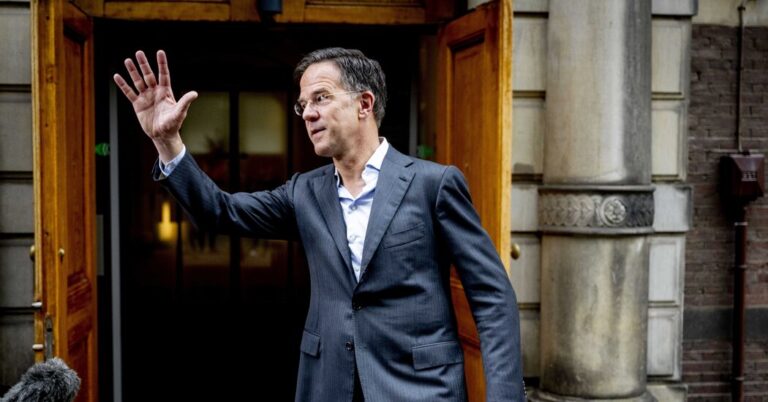Mark Rutte, the long-serving Dutch prime minister, was officially named NATO’s new secretary general on Wednesday, placing an experienced, staunchly pro-Ukrainian leader with a reputation for conciliation at the helm of the alliance.
Mr Rutte, 57, will succeed Jens Stoltenberg on October 1, at a difficult time for NATO over Russia’s war against Ukraine and in the midst of a tight race for the US presidency that could bring Donald J. Trump. , who denigrates the alliance, returns to power.
The decision, sealed by NATO ambassadors at a meeting at the 32-nation alliance’s headquarters in Brussels, removes a potentially contentious issue from the alliance’s 75th anniversary summit next month in Washington.
President Biden and his NATO counterparts will formally welcome Rutte to their table at a summit beginning on July 9.
Mr. Biden’s long-time favorite for the job, Mr. Rutte served as Dutch prime minister four times, for nearly 14 years, building complex coalitions through debate and compromise. These skills should be useful in an alliance that operates by consensus, where one country can block the intentions of the others.
Mr. Rutte has rejected Mr. Biden’s request to run for the NATO post at least once before, forcing the alliance to extend Mr. Stoltenberg’s term by a year.
Currently acting prime minister ahead of the inauguration of a new Dutch government, Mr Rutte is known for being a hard worker but an affable boss. A man of habit, son of a car dealer, he has lived for 30 years in the same modest house, with the same furniture.
Every summer, he rents the same house with members of his family and spends a few days each year in New York with the same friend, in the same modest hotel in Chinatown, writes Caroline de Gruyter, European correspondent for the Dutch newspaper NRC Handelsblad, in Foreign policy.
He is also known for cycling to work, a habit that will need to change as his new job will require him to endure significantly increased security everywhere he goes. He will also have to give up the weekly social studies class he has been giving for years at a high school in The Hague.
Rutte will take over as NATO struggles to find a way to reassure Ukraine of its long-term commitment to its security at a time when the country faces increased Russian pressure after more than two years of war.
Allies also fear that Mr Trump, who has been openly hostile to NATO and some of its leaders, could win back the presidency even if Mr Rutte we got along well with Mr. Trump when he was in office.
In February, in a speech at the Munich Security Conference, Rutte called on Europeans to “stop whining, complaining and nagging Trump” and instead act in their own interests by strengthening their militaries and producing more munitions for Ukraine.
Americans will decide the next president, he said, adding: “I’m not American, I can’t vote in the United States. We have to work with whoever is on the dance floor. »
Mr Rutte was the favourite of NATO’s biggest countries, but he needed unanimity. He virtually clinched the secretary-general’s job last week by agreeing to abide by a compromise worked out between Mr Stoltenberg and Hungarian Prime Minister Viktor Orban.
The illiberal democracy in Hungary defended by Mr. Orban has been a source of tension for years with the longest-serving leaders of the European Union, including Mr. Rutte.
Mr. Rutte assured Mr. Orban, who is close to Russian President Vladimir V. Putin and believes Ukraine should negotiate a settlement with Moscow, that no Hungarian personnel would participate in NATO missions to support the Ukraine and that no Hungarian funds would be paid. used to support them
Slovakia, another sceptic, then agreed to back Mr Rutte, and the final hurdle was removed when the Romanian president abandoned his own bid to become leader of the alliance.
Mr Rutte’s views on the Kremlin were deeply affected by the shooting down of Malaysia Airlines flight MH17 over Ukraine in 2014, with 196 Dutch people among the 298 people killed by a Russian anti-aircraft missile supplied to separatist forces by the Russian military.
In September 2022, seven months after Russia invaded Ukraine, Mr Rutte told the UN about Mr Putin: “He will not stop in Ukraine if we do not stop him NOW. This war is bigger than Ukraine itself. This is about upholding the international rule of law. He described Mr Putin as “cold, brutal and ruthless”.
Under Mr. Rutte, the Netherlands increased its military spending to more than 2 percent of gross domestic product demanded of NATO members, and it supplied Kiev with F-16 fighter jets, artillery, drones and munitions while investing more in their own military. .
Known in the Netherlands as the “Teflon Mark” for his ability to create compromises and evade difficulties, his skills will be put to the test in his new role, especially as the job of secretary general of NATO is less about leading a large and diverse alliance and more about holding it together.


